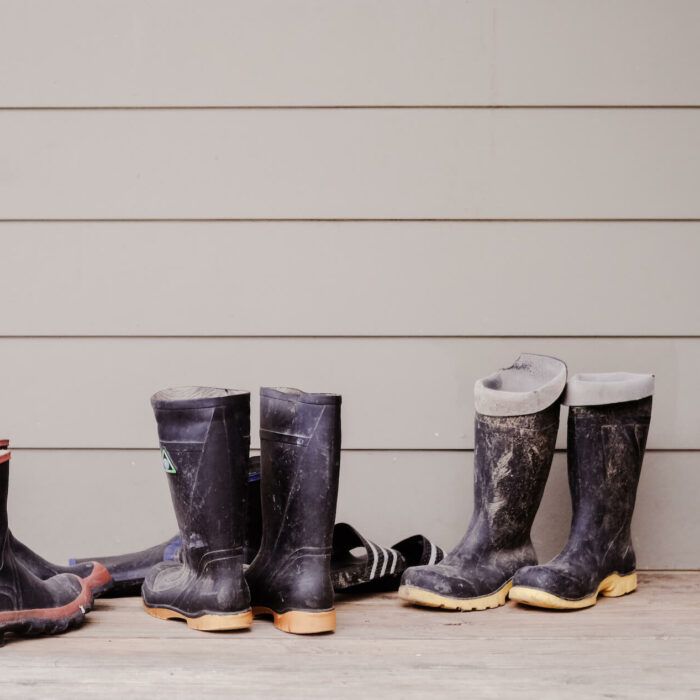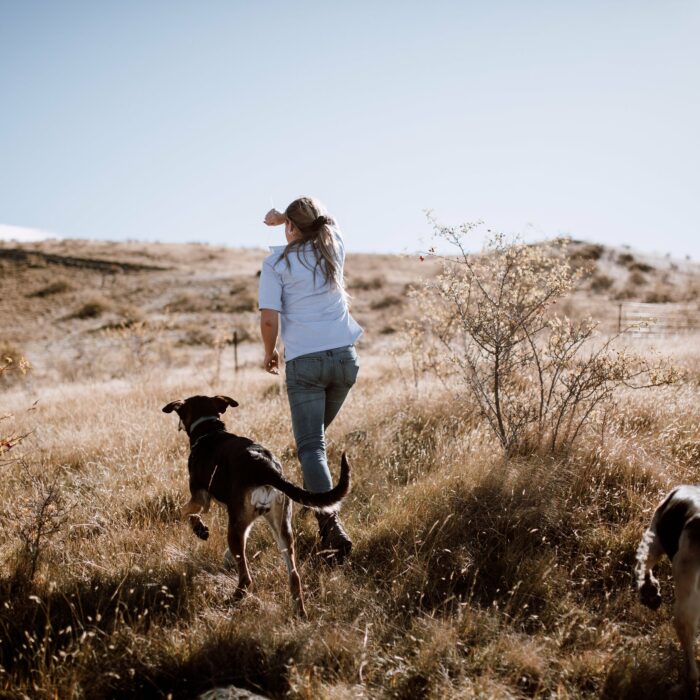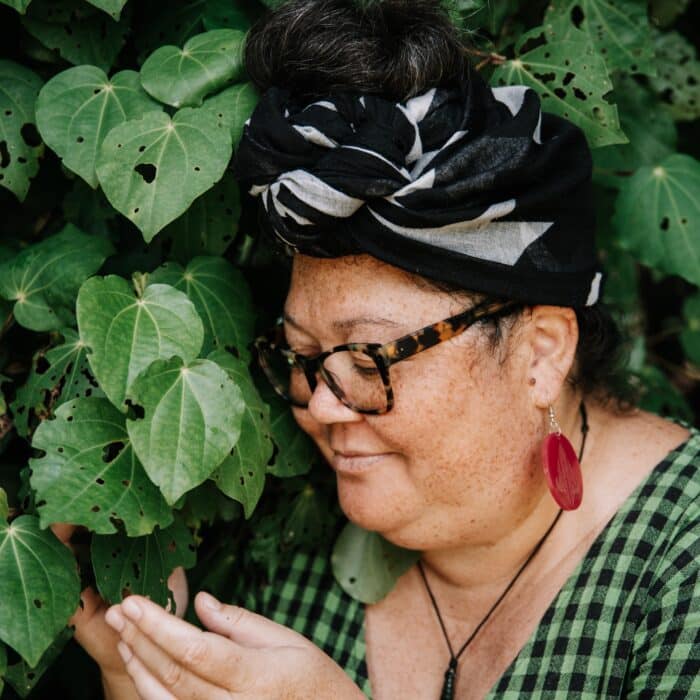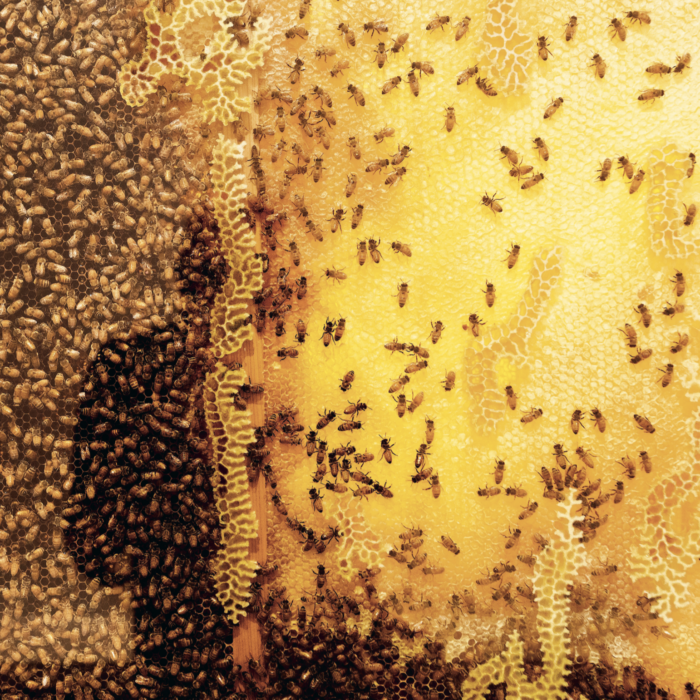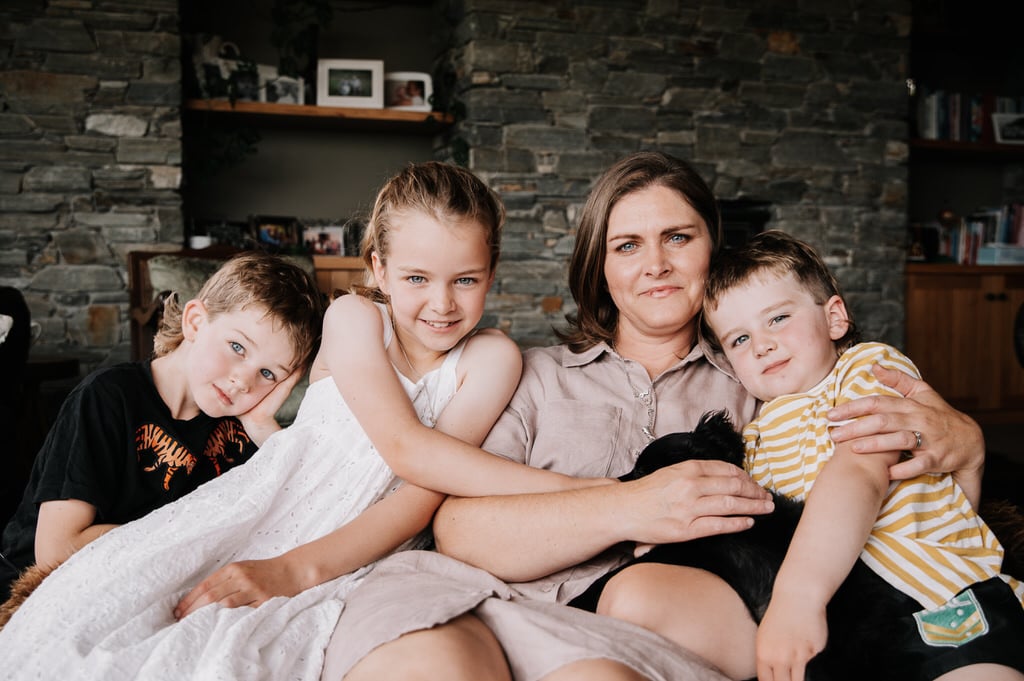
I’m a farmer in Pongakawa. It’s the best-kept secret: we’re only about forty minutes to Whakatāne, Rotorua or Tauranga, and on a clear day I can see across to the ocean.
I grew up on a dairy farm five kilometres down the road from where I’m living now – I’m a Pongakawa girl, born and bred. I am the oldest of four girls and all four of us are farming – three locally, and our other sister in the South Island. We were raised by a very feminist mother. The saying in our household was: “Anything a boy can do, girls can do better.”
I live here with my husband, Luke, and our three kids – Iris is eight, Will is six and Henry is four. We graze dairy cows and bring on young stock. Luke works on the farm – he’s quite mechanical and he fixes all the stuff I break! – but his focus is working for our business in town. We called the farm Tuakawa, but lately we are calling it Zoo-akawa! With all the children and animals around, it’s fun but hectic.
The Breast Cancer Foundation (BCF) has done such an amazing job with awareness and fundraising – you can even buy pink Red Bands now! Thirty years ago, if you were diagnosed with breast cancer or a gynaecological cancer, your chances of surviving the next five years were about the same – about twenty-four per cent. Due to the awesome work of organisations like the BCF, we’re all so much more comfortable talking about our breasts and we know what to look out for. With earlier diagnosis, as well as better access to treatment and medication, the five-year survival rates for breast cancer is now around eighty per cent, which is so great. But what’s not so great is that for gynaecological cancers, the statistics haven’t changed much – the five-year survival rate is still around twenty-four per cent.
New Zealand puts more money into decreasing the road toll, but I’ve read that more women die every year from ovarian cancer than they do on our roads. And that’s just ovarian cancer; there are four other gynaecological cancers – cervical, uterine, vaginal and vulvar. We’ve normalised talking about breasts, so let’s remove the stigma about talking about our vaginas, too.
It’s personal for me because in March 2020, during the first big Covid lockdown, I was diagnosed with cervical cancer. I was 33, with three young children, and running a farm.
Back in 2018, my midwife noticed an unusual pea-sized lump on my cervix when I was in labour with Henry. She thought it probably wasn’t an issue because your body can do weird things when you’re pregnant. But she referred me to a gynaecologist just to be on the safe side. The gynaecologist couldn’t see anything and thought – given my age, recent pregnancies and hormonal changes – it might have been a nabothian cyst that had since resolved. And I was like, “Oh, phew! That was lucky.” Also, I’m quite onto it with health stuff. I was up to date with my smears, and I’ve never had an abnormal smear.
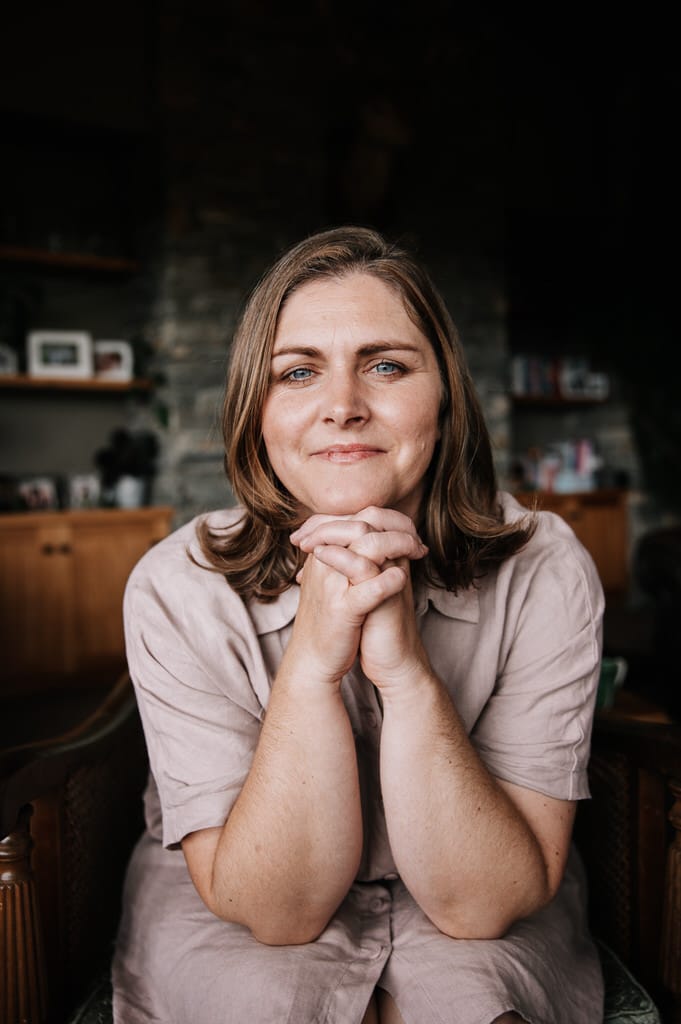
Fast forward nearly two years. One Friday afternoon I had some full-on bleeding that wasn’t related to my period. But I was supposed to be going on a girls’ weekend – my first in a long time. I thought, I’m not in any pain, and I can’t go to the doctor until Monday anyway, so I put a pad in and headed off.
When I did see my GP, she thought I had a cervical ectropion, which can make you bleed easily and usually clears up by itself without treatment. Luckily, she referred me back to the gynaecologist. When he said he needed to do a biopsy right away, I just knew it was bad. I had to wait a couple of weeks for the results. Because we were in lockdown by then, I got the news over the phone that the biopsy indicated I had cancer and I needed more tests. It felt like every phone call and every conversation with the doctors, it was worse than they thought. Finally, they told me I had stage 2B cervical cancer – an adenocarcinoma. Stage 2B means the cancer had spread up into the tissues around the cervix. Adenocarcinoma starts in the glands, which is why it wasn’t being picked up by smears. The treatment that I needed – chemotherapy and radiotherapy combined with brachytherapy – wasn’t available in the Bay of Plenty, so I had to travel to Hamilton for six weeks. You get a long list of possible side effects and it’s quite overwhelming.
The Cancer Society has lodges where people who need to travel for treatment can stay for free. I was one of the youngest people there – sometimes people presumed I was staff because they thought I was too young to have cancer! Because of lockdown, Luke was working from home anyway, but with three children under five, and managing the small orchard we owned at the time without me, he needed some extra support. As we had life insurance with trauma cover, we were able to hire an au pair, help for the farm and a second car so I could travel to treatment.
By week three, I decided that I couldn’t do the treatment on my own, so Luke came and stayed with me in Hamilton. I was so lucky to have family support: one sister flew up from the South Island and managed the household, and another set up a meal train. Six weeks’ worth of meals booked out in two days. Some people missed out, and they were like, “Oh, we missed the meal train, so we’ve done baking,” or, “We’re coming to mow your lawn.” The meal train was amazing for directing people's energy because everyone wanted to pitch in and help.
In Hamilton, I connected with three other women who were going through cervical cancer treatment at the same time. We were each other’s cheerleaders. And we were like, “Bloody fanny cancers,” and told each other inappropriate jokes. Black humour does get you through.
There’s also a fine line between being pessimistic and realistic. It pays to hope for the best and prepare for the worst. I would think, “The worst possible news they could give me today is X, Y, Z.”
I’m now two-and-a-bit years post-treatment. In April 2022, after a few months of uncertainty, they were able to confirm that I am cancer-free. I’m in this space of gratefulness – grateful that cancer was still a national priority during Covid; grateful I had support from my family and my amazing community; grateful that I had finished growing my own family, because the treatment impacted my fertility.
Like anything, it has its highs and its lows. Even when you’re given the all-clear, you don’t come out the other side of it unscathed. Emotionally, it doesn’t ever leave you, and I still get some pain as a side effect of the treatment. I’m busy with my family and the farm and I don’t really have time to sit around and dwell. I’m even more hypervigilant about my health and I get everything looked at. I’ve got a direct dial to the hospital now!
Last year a friend of mine asked me to talk at a Rural Women’s event about my cancer experience. I wasn’t keen. Te Puke is a small place, and I didn’t want to bump into people who knew about my broken vagina. But then I decided that awareness is more important. I invited a friend who has ovarian cancer to talk too, as her story’s different to mine. There isn’t a screening programme for ovarian cancer. The symptoms are similar to irritable bowel syndrome, so women can find it hard to get a diagnosis.
Our talk was really well received. It actually spurred one of my friends into action. She has a family history of uterine cancer, but she’d been too busy to make an appointment. She told me it was just the kick in the butt she needed to go and see her doctor. Sadly, she did get a cancer diagnosis but because she saw her doctor when she did, they are able to treat it. She said, “You’ve potentially saved my life.” But she was the one that heard the message and took action. Some women know it in the back of their minds, but they need that extra push to make an appointment.
I encourage people to know their bodies, so they know when something is not right. Maybe your periods are heavier or more painful. Or you’re having abnormal bleeding not related to your period, or bleeding with a bowel movement, extra mucus, or pain during sex. These are all things you should talk to your GP about.
You also have to advocate for yourself and ask questions. I did Google a lot, and sometimes the information was confronting, but I also felt like that gave me a lot of direction for more meaningful conversations with the specialists.
As well as the awareness-raising talks, I’ve started doing fundraising in my local community specifically for gynaecological cancers. You don’t know who you’re going to affect with your story. We’ve all got vaginas and vulvas and uteruses and we’ve all got sisters, aunties, cousins and mothers.
I feel obligated in a way; and somebody’s got be the change-maker. I no longer cringe when I say the word ‘vagina’. It took me a while, but we all need to get there, because it’s important. It could be life-saving.
Postscript. Sjaan contacted us at Shepherdess to tell her story, frustrated at the lack of media coverage during Gynaecological Cancer Awareness Month in New Zealand.
More information: talkpeach.org.nz; cureourovariancancer.org
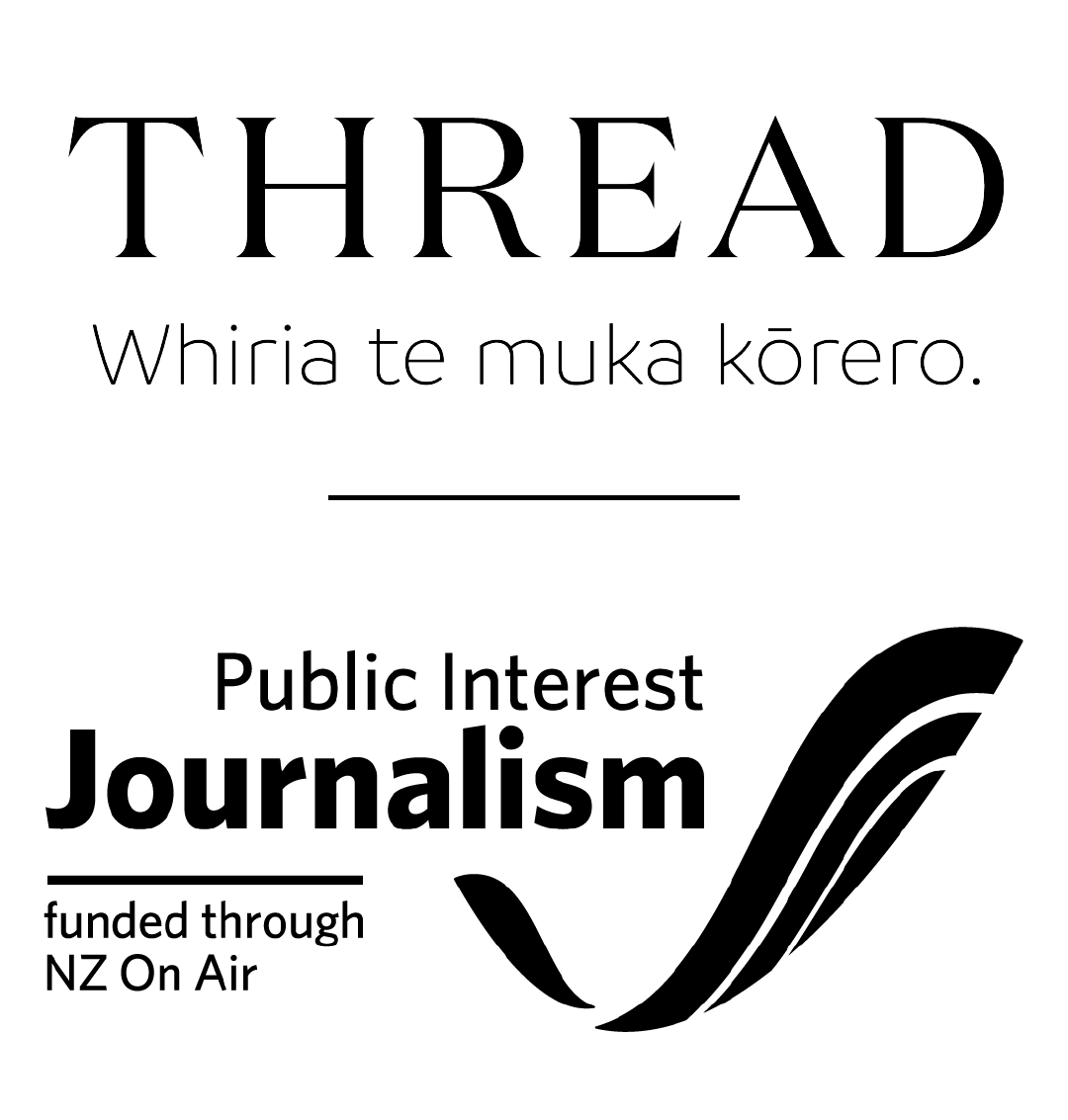
This story is part of THREAD, a year-long project by Shepherdess made possible thanks to the Public Interest Journalism Fund through NZ On Air.
Related Stories
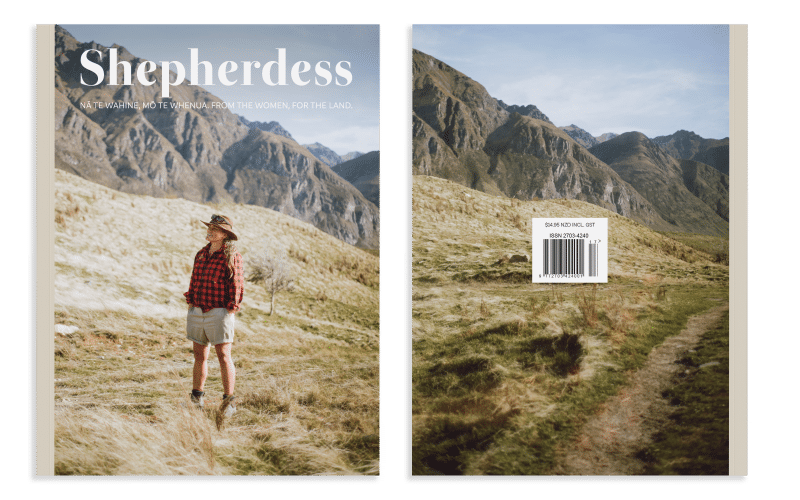
Out Now
Seventeenth Edition
Our beautiful Ngahuru Autumn 2024 Edition is out now!
